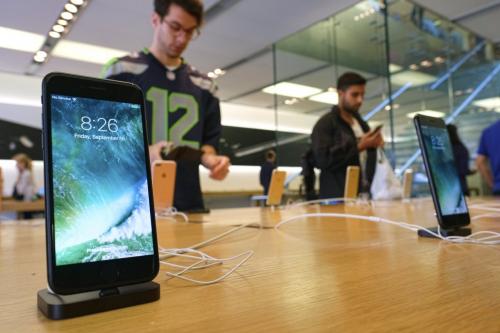The bitter legal dispute between Apple and Qualcomm has escalated sharply overnight as the former designs out Qualcomm components from future products. According to the WSJ, Apple, locked in an intensifying legal fight with Qualcomm, is designing iPhones and iPads for next year that would jettison the chipmaker’s components.
Apple is considering building the devices only with modem chips from Intel and possibly MediaTek because “Qualcomm has withheld software critical to testing its chips in iPhone and iPad prototypes, according to one of the people.” The move is a dramatic reversal for the long-running relationship: Qualcomm, which has worked with Apple for a decade, stopped sharing the software after Apple filed a federal lawsuit in January accusing Qualcomm of using its market dominance unfairly to block competitors and to charge exorbitant patent royalties. Qualcomm has accused Apple of mischaracterizing its practices.

The dispute is centered on modem chips, but Apple’s strategy to reduce its dependence on Qualcomm has been underway since the iPhone 7 rollout. The WSJ continues.
Apple’s planned move for next year involve the modem chips that handle communications between wireless devices and cellular networks. Qualcomm is by far the biggest supplier of such chips for the current wireless standard. Qualcomm said its “modem that could be used in the next generation iPhone has already been fully tested and released to Apple.” The chip company said it is “committed to supporting Apple’s new devices” as it does for others in the industry. Apple in the past used only Qualcomm modem chips for iPhones, but started also procuring the chips from Intel for its iPhone 7 and 7 Plus models last year. It again used a mix of the two in the iPhone 8 and 8 Plus that started selling in September.
Some additional context on Apple’s significance to Qualcomm’s revenue.
The Apple plans indicate the battle with Qualcomm could spill beyond the courtroom feud over patents into another important Qualcomm business where it has the potential to send ripples through the smartphone supply chain. Qualcomm last year sold around $3.2 billion of modem chips a year to Apple, or 20% of its total chip sales, according to an estimate by Macquarie Capital. This year, Qualcomm’s chip sales to Apple are likely to come to $2.1 billion, or 13% of total chip revenue, reflecting more fully the iPhone 7’s mix of Qualcomm and Intel modems. Selling chips is generally less profitable for Qualcomm than its patent business. Apple paid $2.8 billion last year in Qualcomm royalties, which accounted for nearly 30% of the chip maker’s per-share earnings, according to Macquarie Capital. In the last year, Apple has stopped reimbursing those fees to iPhone and iPad manufacturers, which in turn have stopped paying Qualcomm.







